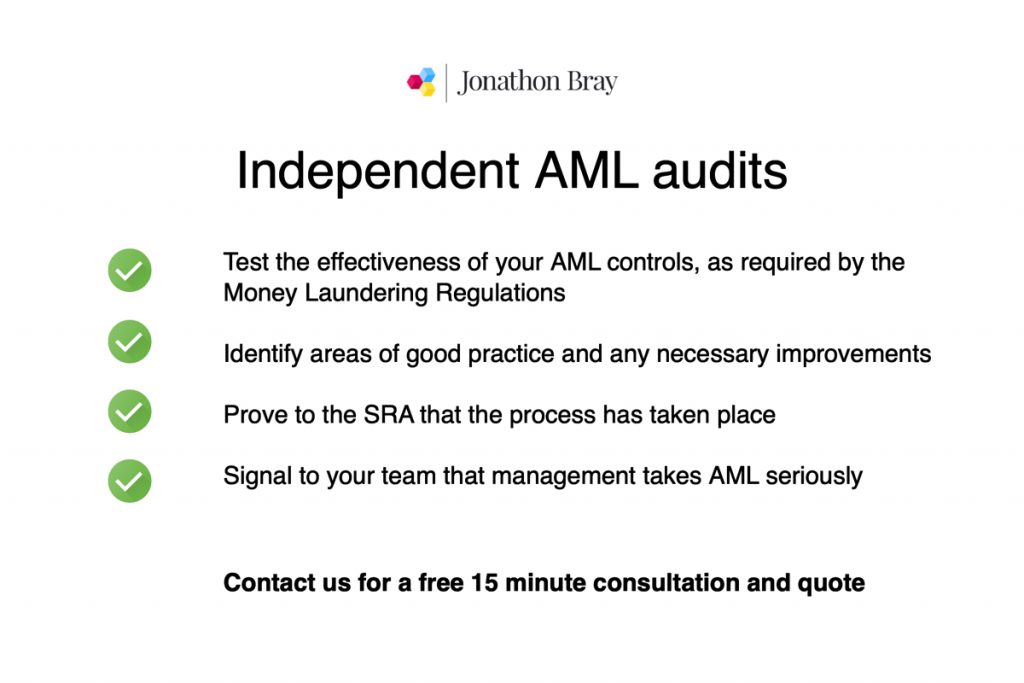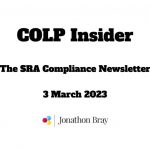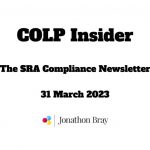Sanctions compliance for solicitors: Key considerations
As global sanctions regimes continue to evolve and expand, solicitors and law firms face increasing pressure to ensure that they are in compliance with all applicable regulations. Non-compliance with sanctions can result in significant legal and reputational risks, including fines, legal action, and damage to the firm’s brand and reputation. To avoid these risks, solicitors and law firms must take proactive steps to ensure that they are aware of and compliant with all relevant sanctions regimes.
In this post, we’ll explore some key considerations for solicitors and law firms looking to ensure compliance with sanctions regulations.
Register for the sanctions webinar
LEO scheme rule changes – you need to make some minor changes to your Complaints Policy
Samantha Bray highlights the Legal Ombudsman rule changes coming into effect on 1 April 2023 and what law firms need to do in response.
ICYMI: Register of overseas entities – Lessons for solicitors considering becoming a verification agent
Last year I wrote about whether it is too risky for solicitors to act as verification agents. I decided to find out first hand what the risk implications are, by signing up as a verification agent.
Some solicitors and law firms have agonised over whether to provide verification as a service to their offshore clients. The demand is certainly there.
Here is what I learned and observed about the process.
News and Guidance

SRA Updates
- [Updated] Case studies: Improper use of client account as a banking facility – The SRA has updated its case studies that illustrate improper use of client account banking facilities by law firms. This should be read in conjunction with the updated Warning Notice on the same topic.
The case studies provide real-world examples of how law firms have breached regulatory requirements. Scenarios covered include:
- Instructing foreign lawyers
- Holding unconnected money in a client account
- Development work and holding money
- Unconnected payments from client account
- Investment schemes and an ‘escrow’ arrangement
- Trust administration work
- Commercial rent deposits
- Lasting powers of attorney
- Lack of availability of UK banking facilities
- Aggregated funds
- Collation of investment funds
- Lender’s condition on mortgage offer
- ‘Legal advice only’ retainers
- Sale of the matrimonial home as part of divorce proceedings
- Parent paying child’s legal fees
- Conveyancing and retentions
These case studies serve as a valuable reminder to law firms to remain vigilant to banking facility risks, which can arise in bread-and-butter instructions.
- In-house solicitors thematic review – This report from the Solicitors Regulation Authority (SRA), based on extensive research of the sector, is a thematic review of in-house solicitors and their compliance with regulatory obligations.
The review aimed to assess the level of compliance of in-house solicitors with the SRA’s Code of Conduct, particularly in relation to independence, confidentiality, and conflicts of interest.
The report found that overall, in-house solicitors were largely compliant with the SRA’s regulatory obligations. However, there were a few areas of concern identified, particularly around maintaining independence, putting in place policies and controls to manage risk, managing pressure, keeping up to date with CPD and risks to ethical behaviour.
The review also found that there was room for improvement in terms of communication between in-house solicitors and their employer clients, particularly when it came to explaining the nature of their role and the scope of their advice.
Additionally, the review identified a need for better training and support for in-house solicitors to ensure they are aware of their regulatory obligations and have the necessary skills to meet them.
Overall, the SRA concluded that in-house solicitors play an important role in maintaining high standards of professional conduct and that efforts should be made to provide them with the necessary support and guidance to ensure they continue to meet their regulatory obligations.
Law Society – New and updated practice notes (may require login)
- Guidance – Suspicious activity reports – The Law Society has issued guidance on Suspicious Activity Reports (SARs) for solicitors. SARs are reports made to law enforcement authorities when there is suspicion of money laundering or terrorist financing.
The guidance aims to help solicitors understand their legal obligations and the process for reporting suspicious activity. It provides an overview of the legal framework for SARs and the role of solicitors in reporting suspicious activity. It outlines the legal obligations placed on solicitors under the Proceeds of Crime Act 2002 and the Terrorism Act 2000, and explains the importance of reporting suspicious activity promptly and accurately.
The guidance provides practical advice on identifying suspicious activity and making SARs, including the key indicators of money laundering and terrorist financing, and the steps that solicitors should take when reporting suspicious activity. It also provides guidance on the process for submitting SARs, including the use of the SARs Online system and the role of the National Crime Agency in reviewing and investigating SARs.
- Regulation – SRA Standards and Regulations: minor amendments – The Law Society has responded to the SRA consultation on minor amendments to the rulebook. The proposed changes aim to streamline the rules, reduce bureaucracy, and provide greater flexibility for solicitors.
The Law Society mostly welcomed the proposed amendments, except:
- amendment 1 – the proposal to restrict firms taking money for costs in advance of work being done and placing them in their business account
- amendment 4 – the proposal to remove the notification process to the SRA on pro bono work provided outside of a firm or organisation
The Law Society suggested that the SRA provide further guidance and clarification on certain aspects of the proposed changes, such as the meaning of “reserved work” and the rules around the use of multi-disciplinary practices. The Law Society also recommended that the SRA ensure that the proposed changes are consistent with other relevant regulations and guidance.
Other Updates
- Legal Sector Affinity Group (LSAG) – Advisory Notice: Chinese underground banking and funds from China – The LSAG has issued guidance on Chinese funds and their potential involvement in money laundering activities.
The guidance is aimed at UK legal professionals who may be involved in transactions with Chinese funds. The guidance provides an overview of the risks associated with Chinese funds and how they may be exploited to evade currency controls in China.
It also outlines the regulatory requirements and best practices that legal professionals should follow to ensure compliance with AML regulations.
The guidance highlights the importance of conducting thorough due diligence on Chinese funds and their beneficial owners before entering into any transaction. It also recommends that legal professionals remain vigilant and alert to any red flags or suspicious activity that may indicate money laundering.
In addition, the guidance emphasises the importance of communication and cooperation between legal professionals and other stakeholders, such as financial institutions and regulatory authorities, to ensure effective risk management and AML compliance.
See also our post from last year:Chinese underground banking – a compliance risk hiding in plain sight.
- Financial Action Taskforce (FATF) – Countering Ransomware Financing – Report on the methods criminals use to commit ransomware extortion and launder the proceeds, with recommendations to governments for beefing up detection and enforcement.
- FATF – Guidance on Beneficial Ownership of Legal Persons – This guidance aims to help countries and businesses implement measures to prevent the misuse of shell companies and other vehicles for money laundering and terrorist financing.
The guidance defines beneficial ownership and provides recommendations on the information that should be collected and maintained. It also outlines the obligations placed on competent authorities to ensure that beneficial ownership information is accurate, up-to-date, and accessible.
The guidance highlights the importance of effective and accurate beneficial ownership information in preventing money laundering and terrorist financing. It provides practical guidance on the steps that legal persons and competent authorities should take to identify and verify beneficial ownership information, including the use of technology and information-sharing mechanisms.
The FATF’s guidance emphasizes the need for a risk-based approach to beneficial ownership, taking into account the specific risks associated with different types of legal persons and the sectors in which they operate. It provides guidance on the factors that should be considered when assessing the risks of money laundering and terrorist financing associated with legal persons, and the measures that should be implemented to mitigate these risks.
- ICO issues reprimand to the Metropolitan Police Service for inadequate handling of files related to organised crime groups – The MPS was found to have disclosed personal information relating to a vulnerable individual without lawful basis, which constituted a serious breach of data protection rules.
The individual had disclosed sensitive information to the police in confidence, and the disclosure of this information to a third party was likely to cause significant harm.
The ICO found that the MPS had breached several aspects of data protection regulations. This included failing to have adequate policies and procedures in place for handling personal data, failing to provide appropriate training to staff, and failing to take appropriate measures to safeguard the personal data of individuals.
As a result of the breach, the ICO issued a reprimand to the MPS and required them to take remedial action to improve their data protection practices.
- Legal Futures – Fast-growing fee-share law firm targets international expansion
- Baxter v Doble [2023] EWHC 486 (KB) – This important case highlights the ‘grey areas’ of the reserved activities contained in the Legal Services Act 2007. A paralegal, Doble, was found to have conducted litigation unlawfully but escaped a finding of contempt.
She had drafted, issued and paid for court proceedings on behalf of clients without being authorised to do so. However, the paralegal argued that she was unaware that she was conducting unlawful litigation.
Mr Justice Cavanagh agreed that the paralegal had acted in good faith. It was also noted that the wording of the Act was unclear.
Free webinars

Next webinar: Sanctions compliance – one year on
One year on from Russia’s invasion of Ukraine, this free webinar will take a practical look at:
- the sanctions regimes and how they apply to law firms,
- who you should conduct due diligence on and how,
- exemptions,
- updated SRA/Law Society guidance, and
- professional duties
And don’t forget, you will have the opportunity to ask your sanctions questions live.
When: Wednesday 29th March, 12:00
Spaces are limited, so if you or your team would like to join, please don’t leave it to the last minute. You can register in advance for this webinar.
After registering, you will receive a confirmation email containing information about joining the webinar.
Feel free to share this email with colleagues who may be interested in this event.
We hope to see you there!
Webinar recording: Terrorist financing – the forgotten piece of AML compliance
Thanks to everyone who took part in this session on 22 February with Rachael and Jon.
You can find the recording here (Passcode: $QC3@b*Z) – available for another 7 days.
The presentation slides are here
SRA and SDT disciplinary decisions

- Lewis Denley Ltd – firm rebuked for keeping ‘unreliable’ books of account.
- Oliver Hanrahan – struck off
- David Anthony Berens – fined £7,501 and issued practising restrictions
- Angelo Luiz-Barrea – rebuked for failing to comply with an undertaking to provide copies of documents.
- John Wright – fined £32,000 for ‘lack of integrity’ after secretly working on the buy side of a property transaction, whilst his firm acted for the seller, resulting in a conflict of interests.
- Susan Pearson – sole practitioner rebuked for allowing a shortfall on client account and failing to promptly return client money.
- Daniel Whittingham – struck off after holding himself out as practising at a national law firm, when in fact he had been sacked, in order to obtain funds from investors.
- Nigel Christopher Brothers – fined £15,000 for facilitating up to £1.8m of undocumented inter-client loans.
- Iftikhar Aziz – banned from running a law firm indefinitely, after being found to have kept significant sums of client money in cash in a safe, mixed up with other funds, without keeping proper books of account.
- Uyiosasere Obaseki – struck off after losing £230,000 of client money to an investment scam.










